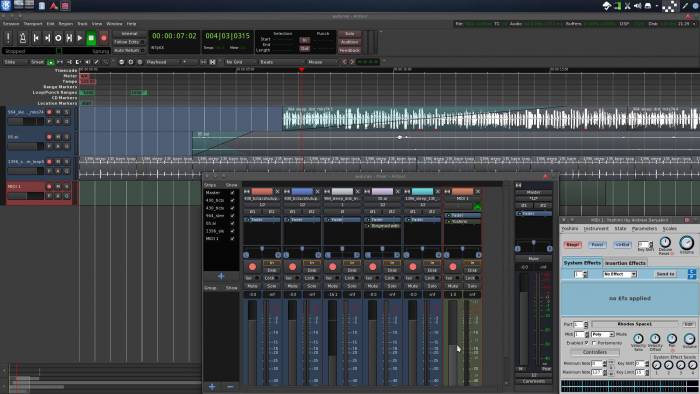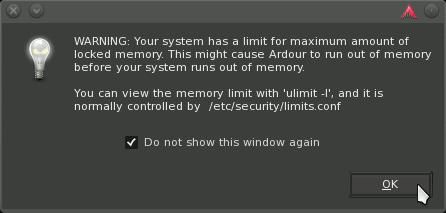Ardour
Ardour is a professional-grade, meat-and-potatoes digital audio workstation: it features all the must-have features that you would expect from a pro DAW, and is actively adding more in a quick but stable manner. It is written by one of the most well-respected audio engineers in the Linux world, and is one of the go-to applications for Linux musicians and audio producers every where.
Strengths [Weaknesses]
Familiar
If you are a flexible and alacritous DAW user, Ardour will be familiar enough to you to pick up in a week or two.
Powerful
Heaps of features, with more appearing each version. Thanks to the communication that the developer has with his user base, the new features are useful and sensible, not just programmer-centric experiments.
Stable
The developer keeps a strictly conservative release cycle, offering only stable and reliable updates to his users.
Weaknesses [Strengths]
Complex
If you are new to professional DAWs, Ardour may at first seem complex.
JACK
Ardour is a JACK-aware application, meaning that it can render complex audio routing that could confuse new users.
Install
Ardour is open source, but the developer requests a donation of at least US$1. Given the price, there's no excuse to decline payment, especially for the quality of application; the money directly supports the further development of one of the finest DAWs on the market on any platform. There are several payment options available (subscription, a purchase for the current and next version and all updates, or arbitrary donations), but all do require PayPal. If you cannot use PayPal for any reason, then you can download Ardour without donating.
To get Ardour:
- Create an account on http://ardour.org and log in.
- Navigate to https://community.ardour.org/s/buy and choose your payment method. Both subscribing and donating require a PayPal account (there seems to be no way to pay through PayPal without having an account). If you choose to not subscribe or donate, you can download the source code, which you must compile yourself.
After paying for the programme, download the Ardour installer.
Make the installer executable:
$ chmod +x Ardour_64bit-4.x.x.run
And then run it:
$ ./Ardour_64bit-4.0.0.run
Ardour by default installs to /opt. You are prompted for your password and if you do not have permission to install to /opt (you do not, unless you have added permission manually), then you are prompted for your root password.
The installer's attempt to create shortcuts (symlinks) on your Desktop will fail; it's safe to ignore those warnings, as Ardour will still be successfully added to your K-menu and to /usr/local/bin. An uninstall script is included with the install, so even though this install is done entirely outside of the usual Slackware conventions (for example, it will not show up in /var/log/packages), it's easy to remove should you need to remove it.
Adding Ardour Low Latency
The installer will also warn you if you have frequency scaling active. If you require a true realtime system, see the Low Latency Kernel section, but for all but the most demanding users, low latency will likely do just fine.
As detailed in the Low Latency Kernel section of this handbook, in order for an application to take priority over other processes, you must grant it permission to be less “nice”. To do that, use setcap:
/sbin/setcap cap_ipc_lock,cap_sys_nice=ep /opt/Ardour-4.0.0/bin/ardour-4.0.0
First Launch
Upon first boot, Ardour will step you through a configuration process; it's safe to accept defaults if you do not have reason to cusomise it. As of Ardour 4.0, JACK is not a hard requirement to use Ardour, but JACK will ensure better performance and more flexibility in what you can use as sound sources.
If you do not use JACK and opt for the standard ALSA system, you will be warned that your system settings are non-optimal:
Ignore this warning; its proposed solution does not apply to Slackware Linux. As long as you have run setcap on /opt/Ardour-4.0.0/bin/ardour-4.0.0 and have respectable system specs, you should find Ardour to be a robust platform.
If you require better performance, use Ardour with JACK.
See Also
Qtractor
MusE
Rosegarden

